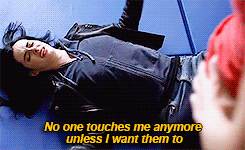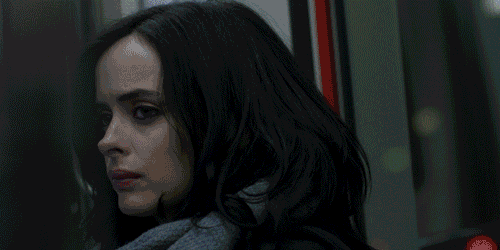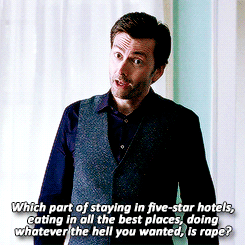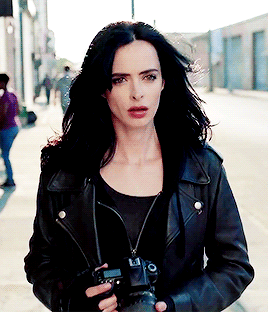*LIGHT SPOILERS AHEAD* If you have not watched Season One of "Jessica Jones" yet, definitely come back after you've watched it all the way through! This article will still be here waiting for you!
I would describe myself as a "casual Marvel fan"—I do enjoy the films, but you won't see me in the theater for the opening weekend each time a new movie comes out. (I'll even skip a film here and there.) But Marvel's “Jessica Jones" presents a different kind of viewing experience that the movies don't offer—and it's a refreshing change.
In this series often described as a “gritty noir mystery," we meet Jessica Jones sometime after she's escaped the tight grasp of her abuser, who, of course, is the villain of the story: Kilgrave. Left traumatized after Kilgrave had dictated her thoughts and decisions with his mind-control powers (including sex without her consent), Jessica, a private investigator with superpowers of her own, makes it her mission to put a stop to his destructive behaviors once and for all.
Not only does “Jessica Jones" present a style that sets it apart from the films of the Marvel Cinematic Universe, but this series, helmed by executive producer Melissa Rosenberg, sets a precedent for how Marvel should write stories for their female characters going forward. Viewers are presented with many feminist themes wrapped into the storyline—and these themes are hard to miss!
If you identify with many of the values of feminism, here's why you should give “Jessica Jones" a try—even if you don't like Marvel movies:
1. Female characters who can hold their own.
Driven by Jessica's traumatic experience with Kilgrave, Trish built herself into a Krav Maga warrior to defend herself—and was then able to match Jessica's super strength with her advanced skill. But make no mistake, the women in “Jessica Jones" do not represent “superficial girl power."
Jessica and Trish, as well as Jeri Hogarth and Claire Temple, are capable, independent women who thrive in their respective work. It's clear that they don't need men to define them, as they are each defined by their experiences, and they each paint a different picture of what it means to be a strong woman.
For Jeri Hogarth, a character that was gender-bent from the comics, that picture is a powerful lawyer who is defined by her career successes (as well her shady methods to achieve) and not her gender.
Then there's Claire Temple, a nurse who has had her share of helping other superheroes, who tells Malcolm “I'm no sidekick"—and she's right. Driven by compassion, not only does she put her career and her life on the line to help Jessica and Luke, but she imparts wisdom on both of them that guides their decisions going forward.
2. Visualizes post-abuse PTSD for viewers who have never experienced it.
When Jessica's investigative search in Episode One leads her to the restaurant where Kilgrave, her abuser with mind control powers, brought her on dates, I was struck by what happened next. Suddenly, the audio sounded distorted and the scene played in a choppy fashion—I actually thought that there was something wrong with my streaming connection on Netflix.
But what I saw was a powerful visualization of what PTSD flashbacks are like for someone like me who has never experienced them. The anxiety, the fear, and emotional pain brought on by familiar stimuli—and the physiological symptoms that follow— were all presented on-screen to demonstrate post-abuse trauma.
Complementing these brave visualizations of post-rape PTSD is Kilgrave's mind control powers, which served to symbolize how men disregard consent from the women that they abuse. Just as Kilgrave was never able to understand proper boundaries due to his ability get whatever he desires, a lack of education on consent keeps rape culture alive in our society.
3. Jessica is a multi-dimensional female hero.
With every Marvel movie comes a hero with a drive to help others and battle of forces of evil. But Jessica Jones is nowhere near perfect. In fact, I'd say that she's the most complex female character Marvel has put on-screen so far— and I don't just mean the small screen either.
When we meet Jessica, we learn that she's a "broken" hero who acts cold and distant towards others, and copes via alcoholism. But her trauma doesn't stop her from being fierce as hell—and as we're shown right off the bat, she will stop at nothing to defend those of whom she deeply cares about.
Yet, the contradiction is that in doing so, Jessica's habits and actions often involve isolation. Sometimes it's for the purpose of keeping her loved ones safe, while other times it's out of feelings of guilt (which many rape survivors actually experience). Her other major conflict, other than taking down Kilgrave, is against herself.
But as multidimensional characters are ones who grow and develop, and their goals and priorities shift over the course of a story, it's satisfying to see Jessica let people close to her again by the end of the season—but I won't give anything away!
What I will tell you, though, is this: expect the ghosts of her traumatic experience with Kilgrave to linger onto Season Two.
4. Brilliantly symbolizes toxic masculinity.
Jessica Jones nailed it when the writers embodied toxic masculinity into two of their male characters...and yes, one of them was Kilgrave. But let's start with Will Simpson, an NYC cop hell-bent on stopping Kilgrave to protect Trish with whom he becomes romantically involved.
In a gender-swapped twist on the “stay in the kitchen" trope, Jessica and Trish, two very capable women, reluctantly decide to include him in their plans upon determining that he would be an asset in their efforts to imprison Kilgrave—in order to bring justice to Hope, one of Kilgrave's recent victims.
But Simpson's urge to act on his conflicting view that Kilgrave is better off dead than alive to keep everyone (especially Trish) safe is heightened when he begins taking performance-enhancing pills (which may or may not have been symbolic). And that's when his already-existing “alpha male" attitudes get kicked into overdrive.
On the flip side of toxic masculinity, Kilgrave has an entitled “nice guy" complex, insisting that his nice deeds earn him the rights to a woman's affection—with sex being part of the package deal—while completely disregarding the subject's actual feelings and desires.
In fact, his delusions of entitlement caused Kilgrave to disregard Jessica's consent completely. But this should come as no surprise: how could a person who has gotten everything they've wanted all their life using mind control understand proper boundaries? And that's what makes him a truly terrifying villain.
But rest assured, not all of the male characters were "toxic."
Malcolm and Luke, by contrast, represented a different form of masculinity that sends the message that men can be sensitive, and should respect female authority. And neither of the two acted is if they were being “emasculated" just by being lead by a woman.
5. Challenges the male gaze and catcalling.
By the end of the season, you'll get to see Jessica annihilate “catcalling," and tear the “male gaze" in half.
Symbolically, that is—allow me to explain:
Out on the street, in some form or another, many women have heard this shouted at them by a man: “C'mon! Give me a smile!"
“Jessica Jones" captured men's attempts to dictate female beauty through “catcalling," and made these acts symbolic in the story: by selecting “smile" as Kilgrave's command of choice when controlling women. The writers actually made him to be the personification of sexism—and it's brilliant.
As for the “male gaze," when Kilgrave gifts the jeans-loving Jessica a sparkly purple dress to wear when dining together midway through the season, she tears the dress in half. With that, she also destroys the notion that she's his object of beauty to control.
6. Produced by women in key creative roles!
These feminist themes in the storyline of “Jessica Jones" would have been difficult to achieve without the perspectives brought to the table by females in key creative roles! Among the many women who brought us arguably the best Marvel series on Netflix were:
- Melissa Rosenberg: creator and executive producer
- Liz Friedman, Allie Gross, and Cindy Holland: executive producers
- Jenna Reback: writer
- Tirsa Hackshaw and Jennifer Barbot: editors
- Rosemary Rodriguez, Deborah Chow, Neasa Hardiman, Minkie Spiro, and Uta Briesewitz directed one to two episodes each.
Oh, and did I mention that Season 2 is ONLY directed by women?
Season Two of Marvel's "Jessica Jones" drops TODAY, March 8, on Netflix!
What do you think of these feminist themes in "Jessica Jones?" Tweet me your thoughts @missjulia1207!
- What 'Jessica Jones' Got Right About My Experience As A Survivor ›
- Jessica Jones Season 2 Addresses Trauma, PTSD In Women ›
- Jessica Jones Is a Show About Trauma That Doesn't Skip Over The ... ›
- Why are people suddenly realizing that Jessica Jones has feminist ... ›
- BBC - Culture - The female superhero is finally here ›
- The Feminine Gaze and Jessica Jones | Rebecca DeVendra ›
- Jessica Jones is 'Not Dressing For Any Kind of Male Gaze' in the ... ›
- Creator of Netflix's 'Jessica Jones' becoming a feminist icon in the ... ›
- Marvel's Jessica Jones is a hard-boiled feminist neo-noir (with ... ›
- 5 Reasons Jessica Jones is the Feminist Hero We Need in 2018 ... ›
- What Jessica Jones Season 2 Understands About Female Rage ›
- Jessica Jones' Feminism Doesn't Include Women Of Color | CBR ›
- In Marvel's Jessica Jones, women get stuff done while men just talk ... ›
- Feminist Frequency • Some Thoughts on Jessica Jones ›
- Is 'Jessica Jones' a Feminist Show? | FANDOM ›
- 'Jessica Jones' Is Sort of Cheating at Feminism - Bloomberg ›
- Jessica Jones: the timely return of a feminist superhero | Culture ... ›






















